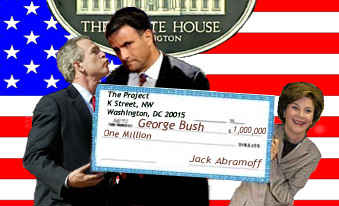

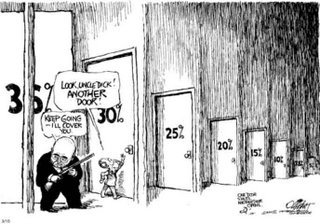


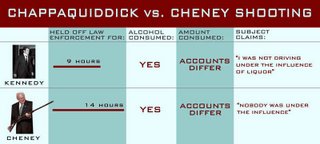

President Bush praised Azerbaijan's president Friday despite human-rights problems documented by the State Department, and he said the country has a "very important role to play" in meeting global energy needs.
Bush met in the Oval Office with President Ilham Aliev, who succeeded his father 2 ½ years ago in a ballot that the State Department said suffered from "numerous, serious irregularities."
With Aliev sitting in an armchair next to him, Bush held out Azerbaijan as "a modern Muslim country that is able to provide for its citizens, that understands that democracy is the wave of the future."
The meeting demonstrated the difficulty the administration faces as it seeks to maintain U.S. access to oil and gas supplies from countries that may be unstable or unreliable, often because of corruption or human-rights abuses.
A year ago, the country celebrated the opening of a 1,100-mile pipeline from its capital, Baku, on the Caspian Sea, through Georgia and on to a Mediterranean port in Turkey. The event was important enough to the U.S. that Secretary of Energy Samuel Bodman attended.
The pipeline creates a link that avoids Iran, Russia and neighboring Armenia to carry 1 million barrels of oil a day to Western markets by 2008.

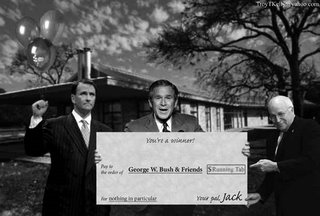
President Bush said Friday that taxing enormous oil industry profits is not the way to calm Americans' anxieties about pain at the gas pump, and that his ``inclination and instincts'' are that major oil companies are not intentionally overcharging drivers.
Bush's remarks suggested the former Texas oilman is unlikely to take harsh action against oil companies despite public anger about the rising cost of fuel. Gasoline is averaging $2.92 a gallon across the country, up 69 cents from a year ago, according to AAA's daily fuel gauge report.


IN AN ARTICLE titled ''The Iran Plans," published in a recent issue of The New Yorker, Seymour M. Hersh -- who helped bring the Abu Ghraib prison scandal to light -- examines what appear to be well-advanced White House plans for a bombing campaign against Iran. Such bombing, according to his findings, might include the use of ''tactical" nuclear weapons, for it seems that Iran's recently elected president, Mahmoud Ahmadinejad, is a ''potential Adolf Hitler."
Though any story based on deliberate leaks is open to a certain skepticism -- who is doing the leaking; what is their real objective -- elements in Hersh's article ring a painful bell. He alleges that President Bush's ultimate goal in his confrontation with Iran is, once again, regime change and that the president believes that ''saving Iran will be his legacy."
Far from saving Iran, if he goes ahead with this plan, Bush will be hailed as the savior of Islamic fundamentalism.


The cost of the war in Iraq will reach $320 billion after the expected passage next month of an emergency spending bill currently before the Senate, and that total is likely to more than double before the war ends, the Congressional Research Service estimated this week.
The analysis, distributed to some members of Congress on Tuesday night, provides the most official cost estimate yet of a war whose price tag will rise by nearly 17 percent this year...
Once the war spending bill is passed, military and diplomatic costs will have reached $101.8 billion this fiscal year, up from $87.3 billion in 2005, $77.3 billion in 2004 and $51 billion in 2003, the year of the invasion, congressional analysts said. Even if a gradual troop withdrawal begins this year, war costs in Iraq and Afghanistan are likely to rise by an additional $371 billion during the phaseout, the report said, citing a Congressional Budget Office study. When factoring in costs of the war in Afghanistan, the $811 billion total for both wars would have far exceeded the inflation-adjusted $549 billion cost of the Vietnam War.
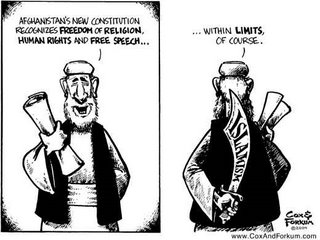
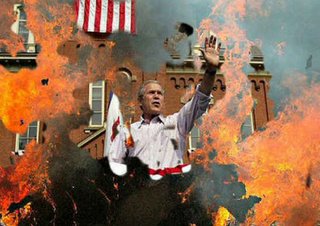
The angry public should keep in mind that Bush and the Republican-controlled Congress have had five years to craft a more sensible energy policy that might have averted -- or at least lessened -- a crisis that has been brewing for months, if not years.
Bush hopes to bring prices down by diverting some oil from going into the Strategic Petroleum Reserve. Problem is, the additional supply won't be enough to significantly depress market prices. Bush also has rolled back some environmental safeguards on fuels and on refinery approvals. That too will have only a marginal effect on prices but will bring us more pollution.
Then there's the the outcry for investigating alleged price-gouging by some oil companies and taxing windfall profits at others -- ideas that some Democrats have embraced. And why not? Shining a brighter light on any industry is always a good idea. And there is something obscene about the record profits being raked in by the Exxons and Chevrons of the world at motorists' expense -- not to mention the $144,573 that Exxon's Lee Raymond earned for each day served as CEO.
But perhaps those profits and executive paydays wouldn't be so obscene if Congress hadn't given oil companies billions in tax breaks in recent years and if the nation's energy policy hadn't been cooked up behind closed doors by Vice President Dick Cheney, a former oilman.
Bush did propose a few sound ideas such as more tax breaks for hybrid cars and greater incentives to promote alternative energy technologies. The phrase ``too little too late'' comes to mind.
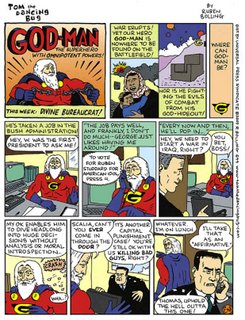
 From OpEd News - click here to read more...
From OpEd News - click here to read more...
WASHINGTON - President Bush on Tuesday ordered a temporary suspension of environmental rules for gasoline, making it easier for refiners to meet demand and possibly dampen prices at the pump. He also halted for the summer the purchase of crude oil for the government's emergency reserve.
Any bets on how long a "temporary suspension" will last?
And is anyone else detecting a pattern here?
In the wake of Katrina, Bush suspends
In the aftermath of 9/11, Bush basically suspends the Fourth Amendment and, at Gitmo, the right to a fair trial.
There is no tragedy, crisis or concern in this country that will go unmet by this administration ... with a boon to cronies or a bolstering of executive power.
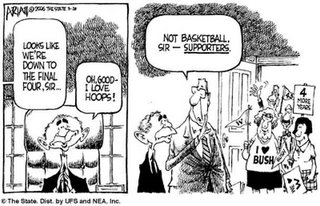

It's almost amusing to see President Bush vowing to get "aggressive on price gouging" at the gasoline pump.
If he takes a good look at why gas accounts for a growing share of the family budget, he'd find contributing factors in which he is more than a little complicit - and for which he has few solutions:
• Federal refusal to demand vehicles be as Fuel-efficient as possible, which could save millions of barrels of oil annually.
• Enactment last year of more than $2 billion in tax breaks to the oil industry and a continuing waiver of royalties for deep-sea drilling at a time of record-high industry profits.
• Minuscule investment in alternative fuel technologies, which Mr. Bush now promotes as the ultimate solution.
• A federal emphasis on increasing domestic oil supplies that downplayed conservation efforts. Remember, it was Vice President Dick Cheney who said in 2001 that conservation "may be a personal virtue, but it is not a sufficient basis for a sound, comprehensive energy policy."
No wonder the nation has grown so dependent on this increasingly scarce commodity that, as Mr. Bush observed, the United States has little sway with unstable but oil-rich countries.
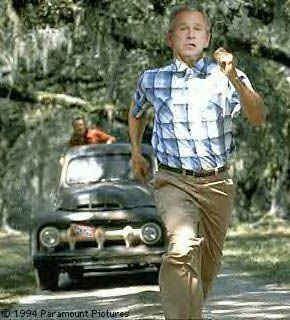
 From the Los Angeles Times - click here to read more...
From the Los Angeles Times - click here to read more...

In 2001, Bush family consigliore, James Baker, presented a report to the powerful Council on Foreign Relations which found that "a new era of energy scarcity was upon the world . . . presenting fundamental obstacles to continued growth and prosperity." (Lawrence Shoup, "The CFR Debates Torture," Z Magazine, March 2006)
Baker's conclusions resulted in the formation of the White House Energy Policy Development Group headed by Dick Cheney. This was the secretive group of oil executives which divided up Iraq's enormous oil reserves before the first bomb was dropped. The plan was clearly endorsed by American elites at the CFR who must have known the WMD scare was a ruse from the very beginning.
The plan to steal Iraq's oil puts Bush's farcical "on-air" burlesque into perspective. US foreign policy is driven by the oil industry, just as the decision to invade was made on the basis of peak oil, not WMD.
Now that gas is topping $3 per gallon, we should consider the heavy price the American people have paid to ensure that profits continue to soar for the oil giants.
In 2002, before the war, Saddam was producing 2.6 million barrels of oil per day even with the debilitating sanctions still in place. Currently, (given the success of Iraqi resistance attacks on pipelines) Iraqi oil production has dropped to a meager 1.1 million barrels per day. In other words, Bush's war has taken 1.5 million barrels a day "offline"; the precise amount the global market requires to reduce prices to the $45 per barrel range.
Consider this: the United States has spent roughly $300 billion on the war so far. At 1.1 million barrels per day (396 million barrels per year) we are currently spending $274 per barrel which translates into $12 per gallon at the pump.
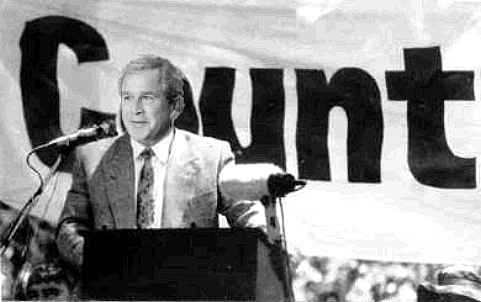
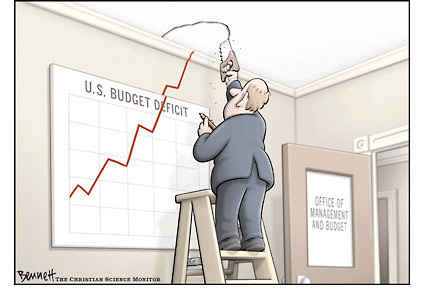
April 26 , 2006
Lawmakers seem to have forgotten the recent exploits of Jack Abramoff
Tomorrow the House will debate a right-wing lobbying reform bill
There are a host of things missing from the lobbying bill - items that would actually give the bill some bite.
The bill up for debate has no restrictions on lavish gifts. The Jack Abramoff scandal showed the extent to which lobbyists were willing to go to influence lawmakers. Rep. Tom DeLay (R-TX) was the lobbyist's skybox guest at sporting events
The bill is also lacking the necessary lobbyist transparency. In January, Rep. David Dreier (R-CA), the main author of the lobbying bill, saw the need for [g]reater transparency, greater disclosure
The revolving door out of Congress into lobbying needs to be slowed. Common Cause notes that nearly 50 percent of lawmakers go onto lucrative lobbying jobs


THE NEW look Digital Millenium Copyright Act (DMCA) seems to be giving the world an unusual moral code.
Details of the upgraded act, which has the blessing of the music and film industry and the Bush administration, are now coming to light. It appears that the DMCA will have a maximum sentence of ten years inside for the crime of software and music piracy. It will also give the FBI the powers to wiretap suspected pirates...
If you copy Craig David's CD you get ten years, but if you punch him in the face and pummel him into a seven day coma you will only get six. You are more likely to get the respect of the prison population with your six year sentence as well.
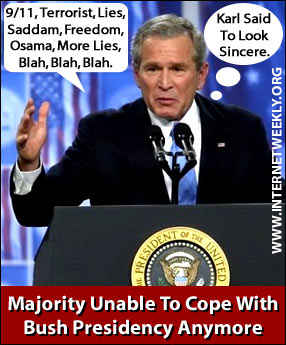

Several prominent Republicans in the House and Senate have urged President Bush to replace Defense Secretary Donald Rumsfeld as part of an administration shakeup.
GOP sources said many in the congressional leadership have warned that growing opposition against Mr. Rumsfeld could result in the loss of the Republican Party's majority in the 2006 elections. They said Mr. Rumsfeld has become the lightning rod for the public discontent with the administration.
"The leadership wants a sacrifice to show the American people that the president is listening to them on Iraq," a leadership source said. "The most obvious choice is Rumsfeld."
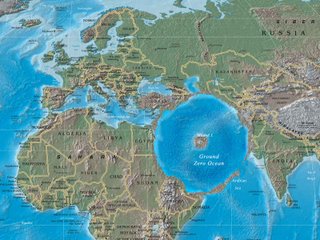

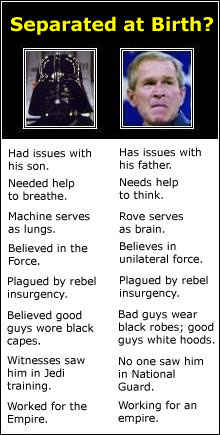







WASHINGTON -- With rising gasoline prices spurring calls for action among worried congressional Republicans, President Bush will respond with a series of measures today aimed at curbing possible market manipulations.
In a speech to a renewable-fuels group, Mr. Bush is expected to instruct the Justice Department, the Federal Trade Commission and the Energy Department to vigorously enforce laws relating to price gouging. And the attorney general and FTC chairman will send a joint letter to all 50 state attorneys general calling on them to use their broader investigative powers to pursue illegal gouging, according to a senior administration official...
To be sure, calling for investigations doesn't promise much in the way of enforcement action, according to industry officials...
For all the political talk, Congress isn't likely to do much, if anything, on energy this year, and there is little lawmakers can do to offer relief before voters go to the polls in November.
